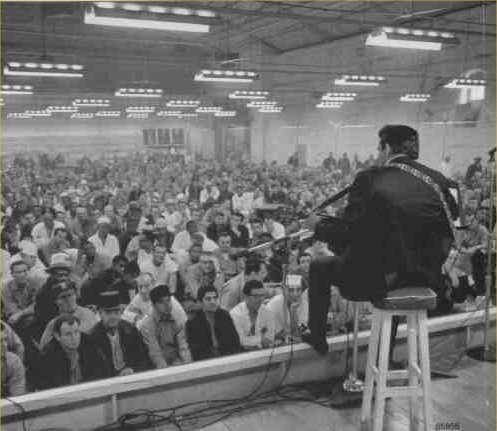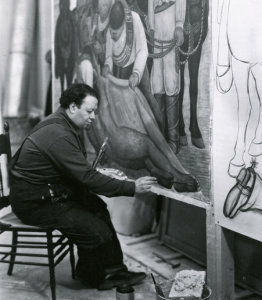“Hello, I’m Johnny Cash.” These famous words once echoed within the walls of a prison that earned its fame through a song. The performance, though, was much more that just a set of lyrics or a nice tune. On January 13, 1968 at the beginning of what would become a tumultuous year, Johnny Cash, June Carter, Carl Perkins and the Tennessee Three performed two shows at Folsom Prison in California. These performances would forever change the landscape of music, reaching Time Magazine’s 100 top albums of all-time in 2006, while also raising awareness for prison reform by putting it into the spotlight.1
Before this performance, Johnny Cash and his health were in a downward spiral. His song “Folsom Prison Blues” was inspired by the film “Inside the Walls of Folsom Prison” in which he saw himself as a prisoner at Folsom. This song caused many of the inmates and people around the United States to believe that he was once incarcerated at Folsom Prison. This was not true, although Mr. Cash had spent a few nights in other jails for drunk and disorderly conduct and possession of drugs. This led many to believe that because of this, Cash’s music and performances resonated with deeply with prisoners.2
The Civil Rights Movement brought attention to prison reform, and Cash’s home state of Arkansas was one of the worst offenders of these kinds of abuses. Their ineffective treatment and rehabilitation of their inmates, along with poor living conditions made him empathize with the men. He decided to use his social and celebrity status he decided to spark a change.His dependence on drugs at the time made Columbia Records unwilling to record a live performance at the prison. But in 1967 both Cash and Columbia Records underwent major changes, and when Bob Johnston was put in charge of Cash’s musical performances, Folsom Prison was a go.3

The performance was set for January 13, 1968, so the band and Cash’s father arrived three days earlier to rehearse the carefully crafted lineup of songs. While at El Rancho Motel in Sacramento, California, the Governor of California Ronald Reagan, who was there for an after-dinner speech, visited the band and offered his words of encouragement.4 The night before the performance, Cash stayed up late rehearsing a song written by inmate Glenn Shirley called “Greystone Chapel,” which was about finding God in the chapel at Folsom Prison. Moved by the lyrics “Inside the walls of prison my body may be/But the Lord has set my soul free.” Mr. Cash vowed to play the song the next day. 5
On the morning of January 13, Mr. Cash met with Los Angeles Times writer Robert Hilburn (who later wrote the biography Johnny Cash: The Life) and photographer Jim Marshall at Folsom Prison where things were tense. A guard had recently been taken hostage, and so the inmates were told not to stand during the show. Armed guards carefully watching the crowd from above, but apart from all the chaos stood a calm man dressed in all black. When he took the stage for his first performance out of two that day, the inmates were told not to cheer until he had introduced himself, and they listened. His first song on the list, Folsom Prison Blues, sent the crowd into an uproar and the entire event was a huge success.6

Four months after the performance, the album At Folsom Prison was released. More importantly was the success that came with it, which allowed Cash to speak more about the reform needed in prisons. “He thought the prison system was broken, it wasn’t fixing anybody,” said Mark Stielper, a friend of Cash’s and the family’s designated historian. “The population was mixed, kids and killers. This was his thing; he was really bothered by that.”7 With no other celebrity making society aware of those issues at the time Mr. Cash brought major spotlight, and as a result he was invited by Senator William E. Brock III (R-Tenn.) in July 1972 to testify before the Senate Judiciary Committee’s subcommittee on national penitentiaries. During the same visit Cash met with President Richard M. Nixon in the Oval Office to further discuss the issue. After these important meetings he continued to perform at other prisons, Mr. Cash also spoke about the issue at concerts and on his TV program, and would also visit inmates at his home in Tennessee to play cards and socialize with them. 8
On top of all the musical success was a nation who did not support the cause of prison form enough, and so no traction was really gained from Cash’s advocacy. The performance though, left a lasting effect on country music and solidified Johnny Cash as someone who stood up for those who are often misunderstood and needed help, mirroring his own personal life in a special way.
“So my intuitive take on the time around Folsom is paradoxical, given what the subject matter was: It was the moment that he came into the light. It’s a paradox, but it’s true. When I think about my dad’s life and I think about that moment, that’s when there’s a kind of force, when he embodied who he really was. And that’s light, no matter how much darkness is in it.”
-Rosanne Cash, daughter of Johnny Cash.9
Video interviews made by Northern Light. | Courtesy of YouTube
- Wikipedia, 2018, s.v. “At Folsom Prison,” https://en.wikipedia.org/wiki/At_Folsom_Prison. ↵
- Allison Stewart, “At Folsom prison, Johnny Cash found his cause,” The Washington Post, May 29, 2018, Accessed September 7, 2018, https://www.washingtonpost.com/national/at-folsom-prison-johnny-cash-found-his-cause/2018/05/28/740124ca-4f03-11e8-84a0-458a1aa9ac0a_story.html?noredirect=on&utm_term=.1974f5815d36. ↵
- Colin Woodward, “The Arkansas prison scandal,” March 22, 2018, https://www.arktimes.com/arkansas/the-arkansas-prison-scandal/Content?oid=15957051. ↵
- The Encyclopedia of World Biography, 2nd ed., vol. 3, 2004, s.v. “Johnny Cash,” 353-355. ↵
- Allison Stewart, “At Folsom prison, Johnny Cash found his cause,” The Washington Post, May 29, 2018, Accessed September 7, 2018. ↵
- Robert Hilburn, Johnny Cash: The Life (New York: Little, Brown, and Company, 2013) 325-327. ↵
- Danny Robins, “Johnny Cash and his prison reform campaign,” BBC World Service, Arkansas, January 23, 2013, https://www.bbc.com/news/magazine-21084323. ↵
- Allison Stewart, “At Folsom prison, Johnny Cash found his cause,” The Washington Post, May 29, 2018, Accessed September 7, 2018. ↵
- Michael Streissguth, Johnny Cash’s ‘At Folsom Prison’: Rosanne Cash Recalls Iconic Live Album, January 12, 2018, https://www.rollingstone.com/music/music-country/johnny-cashs-at-folsom-prison-rosanne-cash-recalls-iconic-live-album-204100/. ↵



67 comments
Eric Ortega Rodriguez
This was a very fascinating article. I knew about the name Johnny Cash before reading this article however I never really looked into his music or his story. I also did not know that he attempted to call to attention the mistreatment of prisoners. I find it very inspirational when an artist talks about a prevalent issue. I also found it interesting that because of his experiences, he could relate more to the prisoners. Overall, great article.
Vanessa Sanchez
This article was inspiring to begin with. The song Folsom Prison Blues was such a huge hit. The message behind the song was to improve the prisons reforms which is very much needed. He brought that message through a song to help people realize what needs to be done to help the prisons. Sadly, the message didn’t go through but the performs was something else, according to the article. It was a very interesting article to read because it showed how much Cash cared about the inmates in prisons.
Bianca-Rhae Jacquez
Music is always a good way to send and spread a message to people. Johnny Cash used his song At Folsom Prison to expose people to the harsh realities of what it is to be in prison. Even though he wasn’t supported greatly he still never gave up and that shows how passionate he was about his efforts. He stood up for those who are looked down to and that’s amazing.
Michael Leary
Johnny Cash was a very interesting musician that wanted to play by his rules, this article shows this by how he went to a prison to perform. I had heard of this before, but, had not really understood a lot about this performance until now. I found it interesting that he played right in front of the prisoners and how there is not really anything between him and the prisoners, he is just on a normal stage, as shown in the picture.
Joseph Radicke
I have been a fan of Johnny Cash for many, many years and had no idea that he was that much of an advocate for prison reform. This article has created a whole new respect for the “Man in Black.” The fact that he was invited to discuss reform in the Oval Office with President Nixon says a lot and I can’t believe I didn’t know about this. I’ve always respected Cash for standing up for what he believed in no matter what people thought and this is no exception. He was certainly an innovator for his time and I really liked this article.
Victoria Salazar
Great article! I never knew about Johnny Cash’s advocacy for prison reform. Although people usually end up in there for the crimes they commit, they are still people who deserve to be treated with common decency. I totally agree with Cash that having “kids and killers” together is a big problem. I have always been a big fan of Johnny Cash and even more so after reading about the life he lived. I think it is great when celebrities or anyone in a position of power use it to advocate for the less fortunate who need a voice.
Danielle Slaughter
As if I didn’t already love Johnny Cash enough. He always put such passionate meaning and depth into his songs, and to have used that passion to champion reform in a place where many believed should remain a place of inhumanity is a wonderful thing. I can’t imagine what it would have been like to perform in front of a crowd of “kids and killers”, young petty thugs intermingled with murderers, but he did it with poise and courage, especially since he could relate to a lot of the inmates. Well done!
Ruben Basaldu
Johnny Cash is one of those names that most people should just know because well he is Johnny Cash. Reading this article I gained a new found respect for him and what he did. He did not have to go and perform at that prison but he did. Not because of the money or anything like that but because he wanted to bring awareness to the issues of the prisons at the time. This was a well-written article and I enjoyed it.
Sydney Aleman
I am a big fan of Johnny Cash and reading this article was truly informational about his performance at Folsom Prison. Knowing he used his fame as a celebrity to bring attention important matters makes me admire Cash more and what kind of man he was. Prisoners at Folsom were able to look up to someone who actually cared about their environment and treatment because back in those days no one cared. Johnny Cash putting a light on a reform was very influential and it’s what makes Johnny Cash, Johnny Cash.
Sarah Uhlig
Not every singer or musician would come to a jail center to perform for the prisoners and not many work with the prisoners to support their rights. Cash seems to stand out in his musicianship and definitely as a human being in his moral and social actions towards his fellow audience members within the jails. I appreciate how he took the issue to the public and shared his concerns to contribute to a difference.